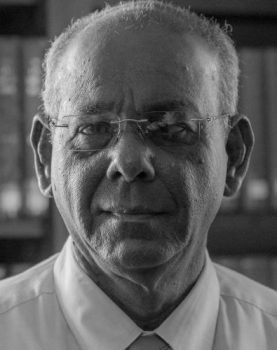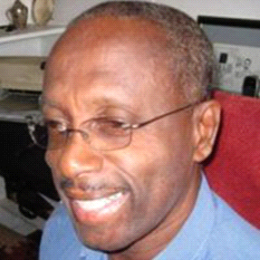Following the AFC’s decision to contest local government elections on its own, political scientist Henry Jeffrey has accused the party of betraying the agenda of the people who had supported it while commentator Ralph Ramkarran sees it as a sign of the likely demise of the governing coalition by the time 2020 rolls around.
In his Future Notes column in yesterday’s Stabroek News entitled `We all cut from the same cloth’ Jeffrey said that because the Alliance For Change (AFC) had so visibly betrayed the agenda of most of the people who have backed it from the inception, predicting the disaster that will befall it at the November 12 local government elections (LGE) has become something of a national pastime. He said that this is so much so, that few people even believe its explanation of why it is going to those elections independent of its coalition partner.
“In other words, what should have been viewed as normal for a coalition partner is seen as either being the result of compulsion or the kind of political deceit at which the PPP and PNC are masters. The AFC came on the political scene claiming to represent a new political morality but instead has become a textbook case of how quickly political power can corrupt!

“Seasoned as I am to political duplicity, I still cannot believe that the AFC is today anywhere near where most of its leaders intended it to be even on election night 2015, but having been, with good intentions, forced into bed with a master capable of making crass political opportunism appear the epitome of self-preservation, good sense and morality, it did not truly grasp the slippery slope one important act of betrayal constituted and the repercussions it could have for the entire body politic.
“When coupled with Guyana’s political history, the AFC’s deception and its swift descent into the political morass has made future efforts at social transformation extremely difficult, for although you might not have thought it possible, political veracity has declined even further, leaving the populace with what may well be the only sensible explanation – ‘Wha’ you expect? We all cut from the same cloth!’”, Jeffrey declared.
He said that everything he know about coalition politics suggests that predictions of the demise of the AFC are correct.
He contended that the APNU+AFC coalition has not been particularly effective and given its short period in office, it has been mired in as many allegations of corruption as its predecessor.
“Where the leadership of the AFC is concerned, far from having anything positive to showcase to the politically vacillating public, think on issues surrounding ExxonMobil, the chair of the Guyana Elections Commission, Guysuco, etc, and it becomes obvious that a case can be made that it has contributed as much, if not more than APNU, to the negative view of the government”, Jeffrey, who formerly had close ties with both the PNC and PPP, stated.
He noted that the AFC explained that it was going to the local government elections independently because it could not reach agreement with APNU.
“What concerns me is that the AFC has been extremely loyal to the coalition, is likely to be wiped out at the polls, but from the song and dance both parties are making about the coalition being intact for the 2020 elections, it appears that the AFC did not take proper advantage of its major value to the coalition. After all, it will be extremely difficult for the APNU to substantiate a creditable ‘win’ in 2020 without the AFC at its side”, Jeffrey stated.
As trade unions need to be able to strike if they are to be taken seriously, Jeffrey said that coalition partners need each other to understand that they are prepared to walk from the partnership if they are not treated with respect. This being so, Jeffrey said that at the very least simple strategy would have suggested that the AFC leave its position on the 2020 elections coalition ambiguous to place greater pressure upon APNU to take it seriously.
Jeffrey noted that some believe that the AFC going to elections alone is merely a coalition ruse to make it appear more independent than it really is and that it will soon change its position, claiming that some kind of an agreement has been arrived at with APNU. Jeffrey said that others, the PPP/C for example, are saying that to make the AFC appear independent in the hope of winning essentially Indian support, the coalition is strategizing its support on the ground in a manner it hopes will enhance the credibility of the AFC. He said there is also the notion that with the international community beginning to show an interest in the country’s broken political system, the coalition needs to show that the ‘national unity government’ it claims it represents is more than a fiction.
“My take on this issue is that the AFC is complicit with APNU in regards to the 2020 elections and the main reason for its being so is the very reason we do not have constitutional reforms that could have made the AFC a truly independent party and positively transform the governance structure in Guyana. It is because the AFC prioritises being in government and APNU wants to remain the senior partner in government and what they have promised in their manifesto and customary political thought would not allow this to happen!”, Jeffrey declared.
Dead meat
Ramkarran in his last Sunday Stabroek column entitled `Dead meat’ said the AFC going alone to the LGE because of the lack of an agreement with APNU has deeper implications.
“The failure to agree now hints at a likely similar failure in 2020 as APNU exercises dominance. Whether the coalition survives beyond 2020 or not, Minister Khemraj Ramjattan’s prediction that the AFC would be `dead meat’ if it coalesces with APNU may still be realised. But both parties tried to put a brave face on the disagreement. The AFC’s statement said soothingly that the `…decision…does not, in any way, change the AFC’s position on coalition politics at the national level.’ (AFC Leader) Mr. (Raphael) Trotman, displaying relief, said `the AFC was not rejected by APNU.’ Reflecting these sentiments, President Granger said that both the AFC and APNU remain committed to coalition politics. But APNU has made a serious mistake in seeking to marginalise the AFC. It was the AFC that helped the coalition to clinch victory in 2015. If it demonstrates continuing resilience, it will be needed in 2020”, Ramkarran argued.
While local government elections are not the most accurate test because voter turnout is usually low, at just over 30 percent, Ramkarran said that there would be some indication as to whether the AFC would be capable of helping APNU in gaining a majority in 2020 or if a coalition would fall short.
Ramkarran added that the travails of the AFC do not mean that third party politics in Guyana is dead.
“There is a growing middle-class and youth population, including many formerly sympathetic to the AFC, and some supporters and former supporters of the main parties that have no stomach for the ethnic politics that have defined our modern political existence. The groups that were close to the AFC had bought in to its promise to end ethnic politics, even as it entered into a coalition with APNU, giving the coalition the benefit of the doubt. They are now satisfied that, however good the intentions of the AFC may have been, it has been unable to influence the APNU to pursue the constitutional reforms that it promised in 2015 which would have had a major impact on ethnic politics. And in relation to governance in its broad sense, there has been no change or improvement from the past. A different style has not led to a different substance or outcome.
“Guyana needs a third party that will not join either of the major parties in a coalition, unless it wins a majority or plurality, because the inevitable result is that it will be entrapped into ethnic politics. The main parties reflect the interests of our main ethnic groups. If either alters this reflective characteristic, it will lose the support of its ethnic base, and this neither party can afford. A third party, however, if it gains sufficient support, can broker a coalition between the two main parties, or support the party which obtains a plurality in return for promoting the alteration of the constitution to engender the necessity for multi-ethnic politics and multi-party, collaborative, governance”, Ramkarran, a former long-serving member of the PPP, said.






